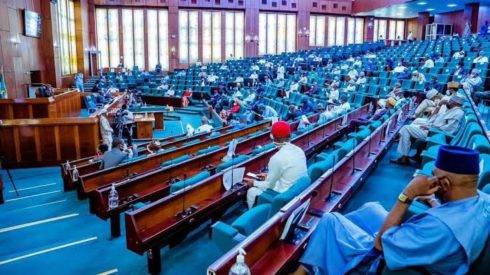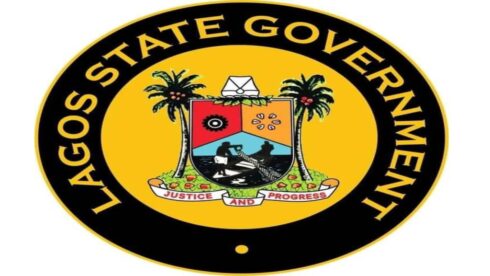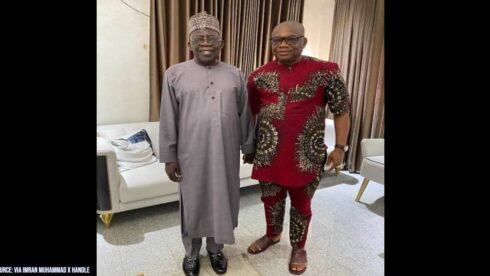In a move aimed at reshaping Nigeria’s political landscape, members of the House of Representatives are advocating for a constitutional amendment that would establish a single six-year term for both the President and State Governors. This proposal is part of a broader effort by a group of legislators in the house of representative known as the ‘Reform Minded Lawmakers,’ who are pushing for comprehensive electoral reforms.
During a news briefing in Abuja on Monday, Rep. Ikenga Imo Ugochinyere highlighted the historical context of Nigeria’s political structure, noting that since gaining independence from Britain in 1960, constitutional and electoral reforms have been pressing issues. He emphasized that these matters have often led to unrest and heightened religious and ethnic tensions. Ugochinyere stated, “Our current political arrangement has some identified distortions, defects, and limitations that call for urgent, focused, and realistic attention, hence this initiative on political and electoral reform.”
The proposed single six-year term is seen as a measure to reduce the frequency of elections, thereby cutting government spending and improving efficiency. This change aims to provide a more stable governance environment, reducing the political desperation and agitation associated with shorter terms and frequent elections. The lawmakers believe that such a term limit will foster greater continuity in governance and allow elected officials to focus on long-term development goals without the distraction of re-election campaigns.
House Of Representative: Proposals for Regional Representation and Vice Presidential Roles
Another cornerstone of the proposed reforms by the lawmakers in the house of representative is the constitutional amendment that seeks to ensure regional representation and clarity in the succession process. The amendment proposes that the President and the 1st Vice President should be chosen from the same region, either north or south. This measure is intended to enhance national unity and reduce regional disparities in political power.
The bill also stipulates that the 1st Vice President would assume the role of President if the President is unable to serve, thus clearly defining the line of succession. Additionally, it introduces the role of a 2nd Vice President, who would be responsible for economic matters. The creation of two vice presidential positions aims to address both administrative and economic needs, ensuring that governance remains stable and effective even during transitions. Ugochinyere remarked, “This amendment seeks to create the office of two vice presidents from the southern and northern parts of Nigeria, with the 1st vice as a succession vice president and the 2nd vice president as a minister in charge of the economy.”
By aligning the President and Vice President’s regional origins, the legislators aim to balance political power across Nigeria’s diverse regions, thereby reducing the desperation and agitation for the creation of new states. This proposal reflects a commitment to ensuring equal representation and fostering national stability.
Broad Electoral Reforms and Financial Autonomy for Local Governments
The Reform Minded Lawmakers’ of the house of representative agenda goes beyond term limits and regional representation, encompassing a wide range of electoral reforms designed to enhance governance and accountability. Among these is the proposal to amend the Constitution to officially recognize Nigeria’s division into six geopolitical zones. This recognition is aimed at ensuring equal representation and reducing the competitive pressures that often accompany state creation efforts.
Another key aspect of the proposed reforms is the financial autonomy and accountability of Local Government Councils. The legislators are advocating for the establishment of an independent Consolidated Local Government Council Account, which would be solely managed by Local Councils. This measure is intended to curb the misuse of funds and ensure that local governments have the financial independence necessary to carry out their functions effectively. Ugochinyere stated, “We are prescribing long-term imprisonment for any misuse of Local Government funds, reflecting our commitment to financial autonomy and accountability.”
These proposed bills, part of a larger package of 50, have already undergone their first reading. The lawmakers in the house of representative are currently unveiling six of these bills to the public, with more expected in the coming weeks. These reforms, if implemented, are expected to touch on every aspect of Nigeria’s development, addressing systemic inefficiencies and fostering a more equitable and stable political environment. : Reactions to Proposed Single Six-Year
Term Bill for President and Governors by House of representative
Expectedly, many Nigerians have reacted to the bill proposed by members of the House of Representatives, which seeks to reform the Constitution to establish a single six-year term for both the President and Governors. This proposal by lawmakers in the house of representative has sparked a lively debate across various social media platforms and public forums, with opinions divided on its potential impact on governance and development in the country.
One notable critic, Arakurin Olabisi, expressed strong reservations about the bill. Olabisi argued that Nigeria is not ready to adopt such a model of government, suggesting that development and accountability would suffer as a result. “Nobody will be accountable for anything since there would be no second term,” Olabisi contended, reflecting a common concern that the lack of a re-election incentive might lead to complacency among elected officials. He concluded with a firm stance, “We shouldn’t even try it.”
Conversely, Abdullahi Umar Zamma praised the House of Representatives for the initiative, viewing it as a pragmatic step towards resource optimization. Zamma remarked, “I think this is a very good idea. Instead of wasting our resources, they should just go for the six years and leave.” His perspective underscores a belief that a longer, single term could potentially streamline governance and reduce the costs associated with frequent election cycles.
Diverse Opinions Highlight Complexities of the Proposal
Hakeem Salam offered a nuanced perspective, suggesting that if Nigeria aspires to be a prosperous nation, it should consider a two-term system with each term lasting six years. “What we practice currently is not ideal for our national peculiarities. There are plenty of examples around the world to support this system,” Salam noted, indicating that a reformed two-term structure might better suit the country’s unique political landscape. Salam’s argument highlights the need for a tailored approach to political reforms that consider Nigeria’s specific challenges and opportunities.
Adding another dimension to the debate, Naroscope pointed out that a single six-year term might reduce political disputes, particularly those arising from re-election campaigns. “This idea of a six-year term best suits the contradicting politics the people play amongst themselves. This would quell the dispute that normally arises when a ruling party campaigns for a second term,” Naroscope explained. He further emphasized that rotating power within the six geopolitical zones could help mitigate ethnic conflicts, fostering a more inclusive political environment.
Oseni Azeeze introduced an innovative layer to the proposal, suggesting a unique role for Vice Presidents. “I have another view for the proposed VPs. Though I uphold succession arrangements, I prefer having six Vice Presidents as Prime Commissioners leading the Geopolitical Zones Development Commissions,” Azeeze proposed. This approach aims to ensure the implementation of development agendas across various regions, potentially enhancing governance and addressing regional disparities more effectively.
The debate surrounding the proposed single six-year term bill by the house of representative continues to evolve, reflecting the diverse perspectives and deep engagement of Nigerians in shaping their country’s political future. As discussions progress, the importance of balancing accountability, development, and political stability remains at the forefront of considerations for lawmakers and citizens alike.
Table of Contents
Discover more from OGM News NG
Subscribe to get the latest posts sent to your email.













